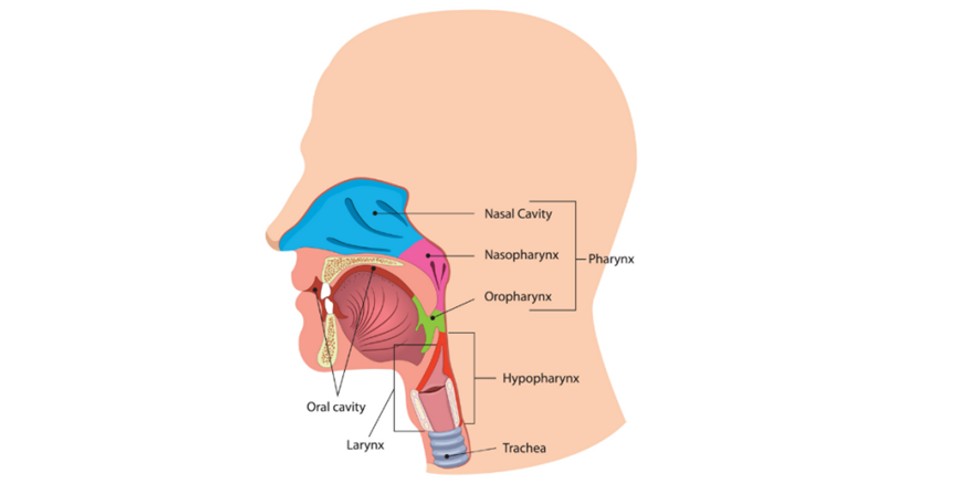Head and Neck Cancer
With a vision to offers comprehensive and state of the art Head & Neck Cancer care, Dr. Vaibhav Choudahry provides the support & guidance patients and their families need with one-on-one consultations.
Sign & Symptoms:
People with head and neck cancer often experience the following symptoms or signs. Sometimes, people with head and neck cancer do not have any of these changes. Or, the cause of a symptom may be a different medical condition that is not cancer.
- Swelling or a sore that does not heal; this is the most common symptom
- Red or white patch in the mouth
- Lump, bump, or mass in the head or neck area, with or without pain
- Persistent sore throat
- Foul mouth odor not explained by hygiene
- Hoarseness or change in voice
- Hoarseness or change in voice
- Frequent nose bleeds and/or unusual nasal discharge
- Difficulty breathing
- Double vision
- Numbness or weakness of a body part in the head and neck region
- Pain or difficulty chewing, swallowing, or moving the jaw or tongue
- Jaw pain
- Blood in the saliva or phlegm, which is mucus discharged into the mouth from respiratory passages
- Loosening of teeth
- Dentures that no longer fit
- Unexplained weight loss
- Fatigue
- Ear pain or infection

Treatments Recommended :
Head and neck cancer specialists usually form a multidisciplinary team to care for each patient, and an evaluation should be done by each doctor before any treatment begins. This team often includes these specialists:
 Surgery
Surgery
During surgery, the goal is to remove the cancerous tumor and some surrounding healthy tissue during an operation. Types of surgery for head and neck cancer include:
- Laser technology: This may be used to treat an early-stage tumor, especially if it was found in the larynx.
- Excision: This is an operation to remove the cancerous tumor and some surrounding healthy tissue, known as a margin.
- Lymph node dissection or neck dissection: If the doctor suspects the cancer has spread, the doctor may remove lymph nodes in the neck. This may be done at the same time as an excision.
- Reconstructive (plastic) surgery: If cancer surgery requires major tissue removal, such as removing the jaw, skin, pharynx, or tongue, reconstructive or plastic surgery may be done to replace the missing tissue. This type of operation helps restore a person’s appearance and the function of the affected area. For example, a prosthodontist may be able to make an artificial dental or facial partto help restore the ability to swallow and speak. A speech pathologist may then be needed to help the patient relearn how to swallow and communicate using new techniques or special equipment. Learn more about reconstructive surgery.
 Radiation therapy
Radiation therapy
Radiation therapy is the use of high-energy x-rays or other particles to destroy cancer cells. A radiation therapy regimen, or schedule, usually consists of a specific number of treatments given over a set period of time. It can be the main treatment for head and neck cancer, or it can be used after surgery to destroy small areas of cancer that cannot be removed surgically.
The most common type of radiation therapy is called external-beam radiation therapy, which is radiation given from a machine outside the body. A specific type of external-beam radiation therapy is called intensity-modulated radiation therapy (IMRT). IMRT uses advanced technology to accurately direct the beams of radiation at the tumor. This helps reduce damage to nearby healthy cells, potentially causing fewer side effects.
Proton therapy is another type of external-beam radiation therapy that uses protons rather than x-rays. At this time, proton therapy is not a standard treatment option for most types of head and neck cancer. See the Latest Research section for more information.
When radiation therapy is given using implants, it is called internal radiation therapy or brachytherapy.
Before beginning radiation therapy for any type of head and neck cancer, patients should be examined by an oncologic dentist or oral oncologist. Because radiation therapy can cause tooth decay, damaged teeth may need to be removed. Often, tooth decay can be prevented with proper treatment from a dentist before beginning treatment. Learn more about dental and oral side effects. People should also receive an evaluation from a speech-language pathologist who has experience treating people with head and neck cancer.
Patients may experience short- and long-term pain or difficulty swallowing, changes in voice because of swelling and scarring, and loss of appetite due to a change in their sense of taste. It is important that patients begin speech and swallowing therapy early, before radiation therapy begins to help prevent long-term problems with speaking or eating.
In addition, radiation therapy to the head and neck may cause redness or skin irritation in the treated area, swelling, dry mouth or thickened saliva from damage to salivary glands, bone pain, nausea, fatigue, mouth sores, and sore throat. Many of these side effects go away soon after treatment has finished. Other side effects may include hearing loss due to a buildup of fluid in the middle ear, a buildup of earwax that dries out because of the radiation therapy’s effect on the ear canal, and scarring (fibrosis). If the treatment damaged lymph nodes, there may be a risk for lymphedema.
Radiation therapy also may cause a condition called hypothyroidism in which the thyroid gland (located in the neck) slows down and causes the patient to feel tired and sluggish. This may be treated with thyroid hormone replacement medication. Every patient who receives radiation therapy to the neck area should have their thyroid function checked regularly. Patients are encouraged to talk with their health care team about what side effects of radiation therapy to expect before treatment begins, including how these side effects can beprevented or managed.
 Chemotherapy
Chemotherapy
Chemotherapy is the use of drugs to destroy cancer cells, usually by keeping the cancer cells from growing, dividing, and making more cells.
A chemotherapy regimen, or schedule, usually consists of a specific number of cycles given over a set period of time. A patient may receive 1 drug at a time or a combination of different drugs given at the same time.
The side effects of chemotherapy depend on the individual and the dose used, but they can include fatigue, risk of infection, nausea and vomiting, hair loss, loss of appetite, and diarrhea. These side effects usually go away after treatment is finished